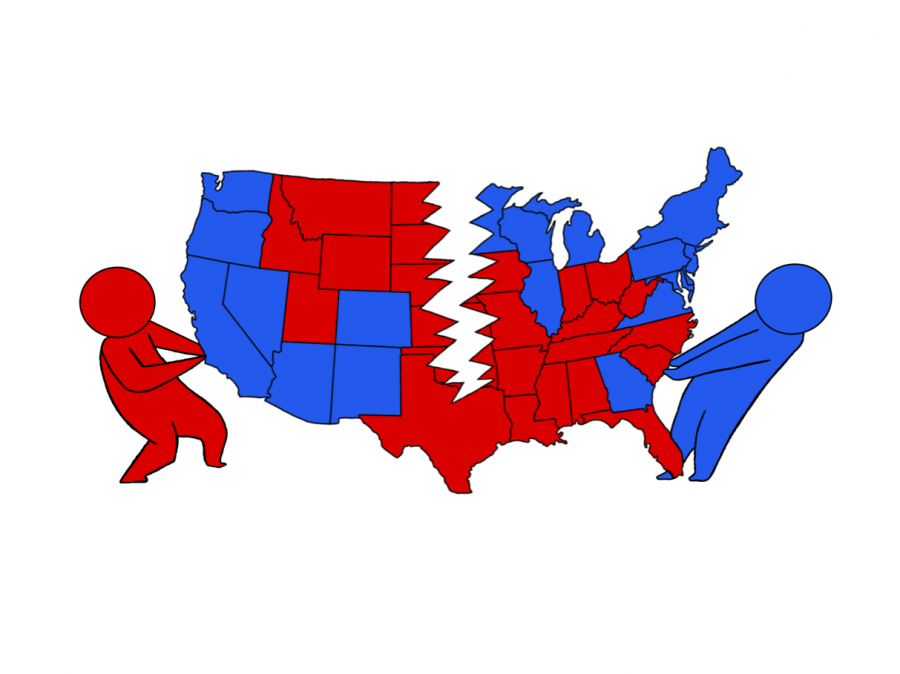How Social Media Contributes to America’s Partisan Problem
America’s political parties are growing farther away from each other — and it’s starting to tear the country apart.
December 8, 2021
Since the dawn of civilization, people have disagreed on how a country should be governed. Throughout U.S. history, two major parties have emerged as America’s dominant political parties: the Democrats and Republicans. These two have stood the test of time — and have often disagreed over the way America should be run.
However, the venom between these two parties has increased sharply in recent years. This has reached every corner of American life, from clashes between extremist groups to the family Thanksgiving table.
How did this happen? Why is America a political warzone?
The biggest reason is social media.
Back in 2004, Mark Zuckerberg founded Facebook in his Harvard dorm room. He had no clue that his idea of creating a virtual ‘face book’ for specific universities would go on to shape the history of the 21st century — and that it would make him one of the richest and most powerful people in the world.
But the problems that Zuckerberg and Facebook — now called Meta — face today are far greater than the ones he had to overcome to get his idea off the ground.
Facebook has been facing backlash from powers as high as Congress, revealing troubling facts about what really goes on behind the scenes. Disturbing developments such as massive data mining operations or in-house knowledge that Meta’s platforms are harmful to teenage girls have been released via a high-profile whistleblower.
Even so, arguably the biggest issue with Facebook, and other platforms of its kind, is the algorithms that make these apps and websites so appealing.
Social media algorithms are designed to give users the content they want to see. If people log onto a social media platform and don’t have content tailored to their interests and beliefs, it’s easy for them to lose interest quickly — which means that companies have to gear their platforms towards retaining the attention of their users for as long as possible.
These algorithms are the reason why your Instagram feed comes up with posts that keep you constantly engaged every time you open it, or how your TikTok For You page comes up with videos that draw your interest.
But when politics are thrown into the mix, these feats of modern technology turn from entertaining to dangerous. For instance, Facebook has been known to target people with political advertising that is slanted towards their beliefs.
This is a big problem because it eliminates a bipartisan view of politics. If people are only exposed to right-wing or left-wing opinions, they’re less likely to be willing to listen to an opposing opinion. Bipartisanship becomes less and less of a reality for a person if they’re only listening to one side of the equation.
This has allowed political campaigns to use social media as a way to target specific audiences. Twitter was one of the biggest reasons why Donald Trump was able to build a cult-like following and incite the Jan. 6 attack on the Capitol.
In short, social media is pushing both parties further away from each other.
While you may not think that this affects you, it very well could in the future. Extreme political ideology is leading to increased violence between parties. Domestic terrorism is becoming more and more of an issue.
America is spiraling towards a dark political future.
So how can we stop the descent?
The answer is in government regulation. Political advertising has to be more heavily regulated by the government. It becomes much more difficult for people to be partisan if their social media feeds aren’t filled with right-wing and left-wing rhetoric. This can help prevent the formation of future extremist groups.
You can also do your own research into current issues. Oftentimes people see a controversial topic and form their opinion based on their party’s standing. This has caused the political rift in prominent cases such as the Derek Chauvin trial, the Breonna Taylor case, and most recently, Kyle Rittenhouse’s case.
Instead of going with what your party thinks, watch trials. Listen to testimonies. Look through all the facts.
Don’t let social media tell you what to think.







Stefan Spielvogel • Jan 19, 2022 at 9:42 pm
Based.